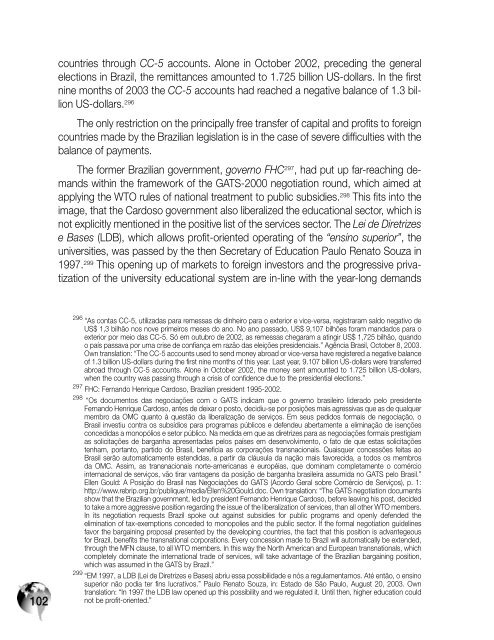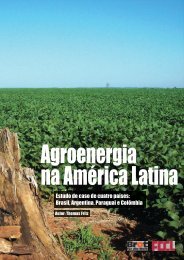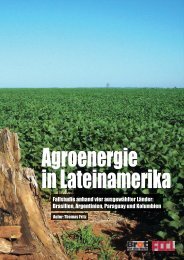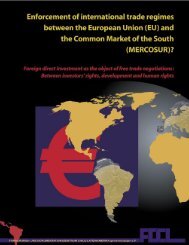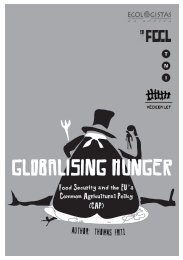Download - FDCL
Download - FDCL
Download - FDCL
Create successful ePaper yourself
Turn your PDF publications into a flip-book with our unique Google optimized e-Paper software.
102<br />
countries through CC-5 accounts. Alone in October 2002, preceding the general<br />
elections in Brazil, the remittances amounted to 1.725 billion US-dollars. In the first<br />
nine months of 2003 the CC-5 accounts had reached a negative balance of 1.3 billion<br />
US-dollars. 296<br />
The only restriction on the principally free transfer of capital and profits to foreign<br />
countries made by the Brazilian legislation is in the case of severe difficulties with the<br />
balance of payments.<br />
The former Brazilian government, governo FHC 297 , had put up far-reaching demands<br />
within the framework of the GATS-2000 negotiation round, which aimed at<br />
applying the WTO rules of national treatment to public subsidies. 298 This fits into the<br />
image, that the Cardoso government also liberalized the educational sector, which is<br />
not explicitly mentioned in the positive list of the services sector. The Lei de Diretrizes<br />
e Bases (LDB), which allows profit-oriented operating of the “ensino superior”, the<br />
universities, was passed by the then Secretary of Education Paulo Renato Souza in<br />
1997. 299 This opening up of markets to foreign investors and the progressive privatization<br />
of the university educational system are in-line with the year-long demands<br />
296 “As contas CC-5, utilizadas para remessas de dinheiro para o exterior e vice-versa, registraram saldo negativo de<br />
US$ 1,3 bilhão nos nove primeiros meses do ano. No ano passado, US$ 9,107 bilhões foram mandados para o<br />
exterior por meio das CC-5. Só em outubro de 2002, as remessas chegaram a atingir US$ 1,725 bilhão, quando<br />
o país passava por uma crise de confiança em razão das eleições presidenciais.” Agência Brasil, October 8, 2003.<br />
Own translation: “The CC-5 accounts used to send money abroad or vice-versa have registered a negative balance<br />
of 1.3 billion US-dollars during the first nine months of this year. Last year, 9.107 billion US-dollars were transferred<br />
abroad through CC-5 accounts. Alone in October 2002, the money sent amounted to 1.725 billion US-dollars,<br />
when the country was passing through a crisis of confidence due to the presidential elections.”<br />
297 FHC: Fernando Henrique Cardoso, Brazilian president 1995-2002.<br />
298 “Os documentos das negociações com o GATS indicam que o governo brasileiro liderado pelo presidente<br />
Fernando Henrique Cardoso, antes de deixar o posto, decidiu-se por posições mais agressivas que as de qualquer<br />
membro da OMC quanto à questão da liberalização de serviços. Em seus pedidos formais de negociação, o<br />
Brasil investiu contra os subsídios para programas públicos e defendeu abertamente a eliminação de isenções<br />
concedidas a monopólios e setor público. Na medida em que as diretrizes para as negociações formais prestigiam<br />
as solicitações de barganha apresentadas pelos países em desenvolvimento, o fato de que estas solicitações<br />
tenham, portanto, partido do Brasil, beneficia as corporações transnacionais. Quaisquer concessões feitas ao<br />
Brasil serão automaticamente estendidas, a partir da cláusula da nação mais favorecida, a todos os membros<br />
da OMC. Assim, as transnacionais norte-americanas e européias, que dominam completamente o comércio<br />
internacional de serviços, vão tirar vantagens da posição de barganha brasileira assumida no GATS pelo Brasil.”<br />
Ellen Gould: A Posição do Brasil nas Negociações do GATS (Acordo Geral sobre Comércio de Serviços), p. 1:<br />
http://www.rebrip.org.br/publique/media/Ellen%20Gould.doc. Own translation: “The GATS negotiation documents<br />
show that the Brazilian government, led by president Fernando Henrique Cardoso, before leaving his post, decided<br />
to take a more aggressive position regarding the issue of the liberalization of services, than all other WTO members.<br />
In its negotiation requests Brazil spoke out against subsidies for public programs and openly defended the<br />
elimination of tax-exemptions conceded to monopolies and the public sector. If the formal negotiation guidelines<br />
favor the bargaining proposal presented by the developing countries, the fact that this position is advantegeous<br />
for Brazil, benefits the transnational corporations. Every concession made to Brazil will automatically be extended,<br />
through the MFN clause, to all WTO members. In this way the North American and European transnationals, which<br />
completely dominate the international trade of services, will take advantage of the Brazilian bargaining position,<br />
which was assumed in the GATS by Brazil.”<br />
299 “EM 1997, a LDB (Lei de Diretrizes e Bases) abriu essa possibilidade e nós a regulamentamos. Até então, o ensino<br />
superior não podia ter fins lucrativos.” Paulo Renato Souza, in: Estado de São Paulo, August 20, 2003. Own<br />
translation: “In 1997 the LDB law opened up this possibility and we regulated it. Until then, higher education could<br />
not be profit-oriented.”


